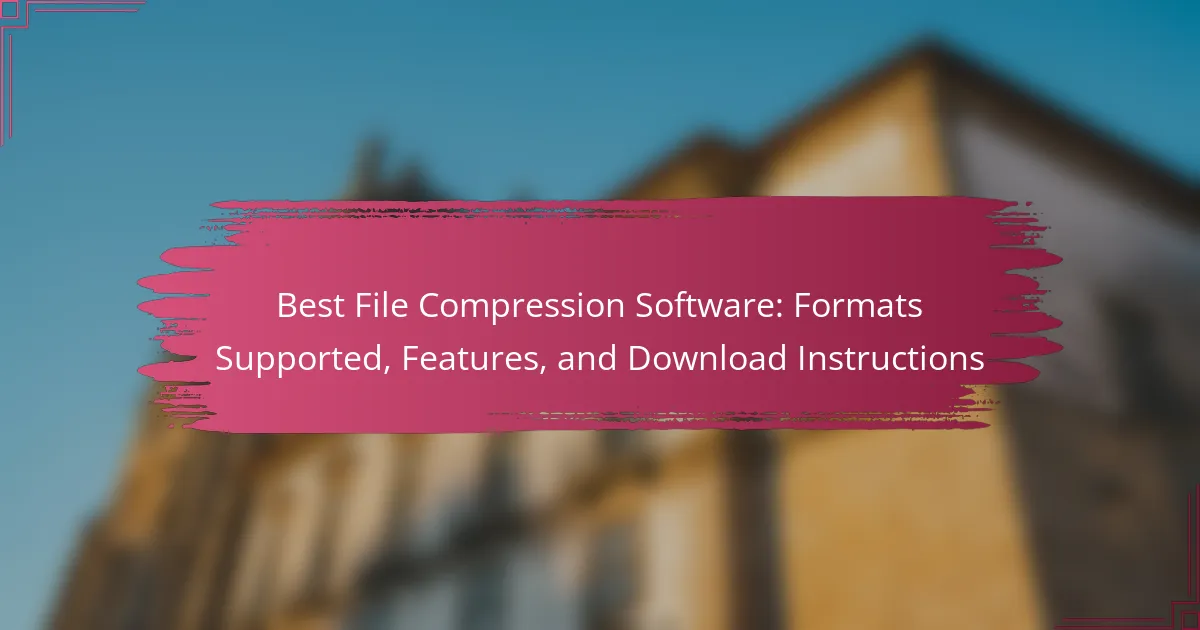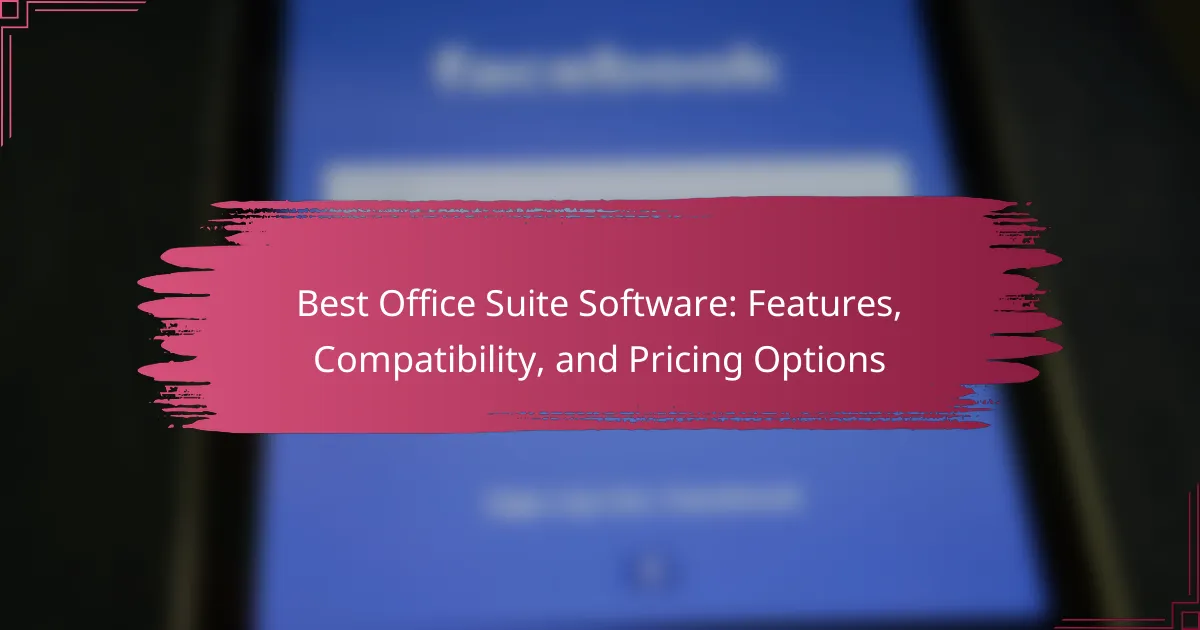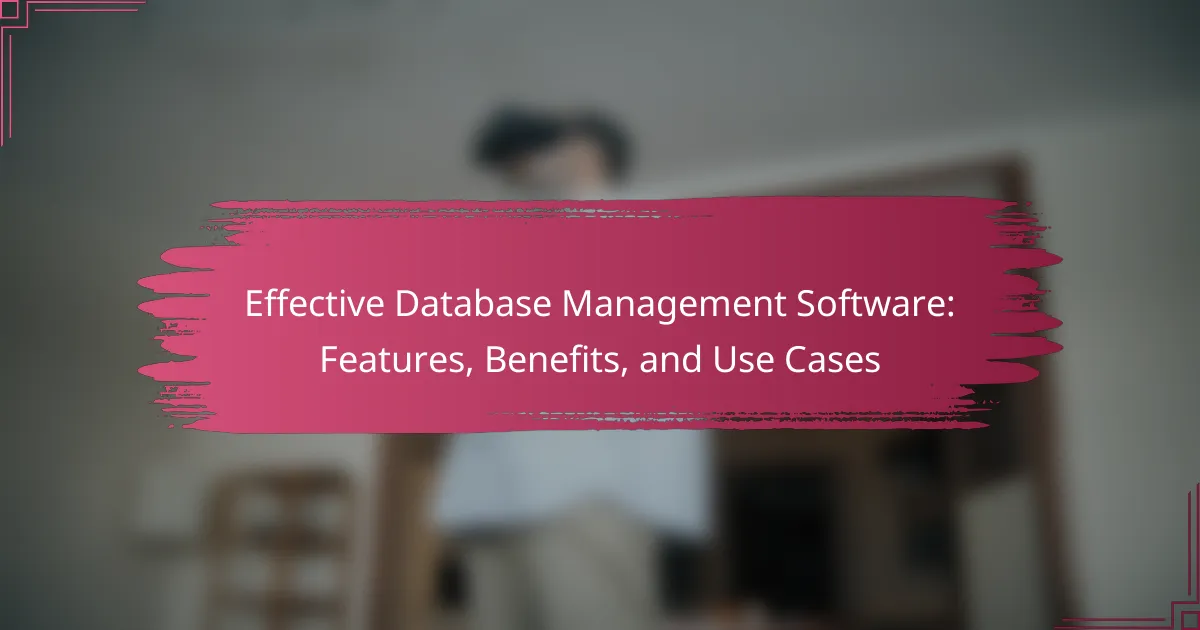Reliable backup software is a critical tool for data protection, designed to create secure copies of data to prevent loss. Key features of effective backup solutions include automatic scheduling, data encryption, and flexible storage options, such as local drives and cloud services. Pricing models vary, with options for subscription plans or one-time fees, influenced by factors like device count and storage capacity. User reviews highlight the software’s ease of use, performance, and security features, while some mention occasional bugs. Overall, reliable backup software is essential for ensuring data safety and recovery, making it a valuable investment for individuals and businesses alike.

What is Reliable Backup Software?
Reliable backup software is a tool designed to create copies of data to prevent loss. It ensures that files are securely saved and can be restored when needed. Many reliable backup solutions offer features like automatic scheduling, encryption, and cloud storage integration. According to a 2021 study by the Data Loss Prevention Association, 70% of businesses that use backup software report a significant reduction in data loss incidents. This emphasizes the importance of using reliable backup software for data protection.
How does Reliable Backup Software function?
Reliable backup software functions by creating copies of data to prevent loss. It typically operates through scheduled backups or manual initiation. The software scans designated files or entire systems for changes. It then compresses and encrypts the data for secure storage. Backups can be stored locally on external drives or in cloud storage. Many reliable backup solutions offer incremental backups to save time and space. They also provide restoration options to recover lost or corrupted files. According to a study by the Ponemon Institute, 60% of companies without a backup strategy suffer data loss.
What are the key components of Reliable Backup Software?
The key components of reliable backup software include data integrity, ease of use, and security features. Data integrity ensures that backups are accurate and complete. This is often achieved through checksums and verification processes. Ease of use allows users to set up and manage backups without technical expertise. User-friendly interfaces contribute to this component. Security features protect data from unauthorized access and breaches. Encryption and secure storage options are common practices. Additionally, scheduling capabilities enable automated backups at regular intervals. Compatibility with various operating systems and file types enhances usability. Finally, customer support and documentation are crucial for resolving issues quickly.
How do these components interact to provide backups?
Backup software components interact through a systematic process to ensure data integrity and accessibility. The primary components include the user interface, backup engine, storage options, and scheduling features. The user interface allows users to configure backup settings easily. The backup engine performs the actual data copying and compression. Storage options determine where the data will be saved, such as cloud or local drives. Scheduling features automate the backup process at specified intervals.
These components work together to create a seamless backup experience. For example, the user sets preferences through the interface. The backup engine then executes these preferences by accessing the designated storage. Regular scheduling ensures that backups occur consistently without user intervention. This interaction minimizes the risk of data loss and enhances recovery capabilities. Reliable backup software integrates these components effectively to provide comprehensive data protection.
What are the main benefits of using Reliable Backup Software?
Reliable backup software provides data protection, ensuring that important files are securely stored. It enables quick recovery from data loss due to hardware failure, accidental deletion, or malware attacks. According to a 2021 study by Data Recovery Services, 70% of businesses that experience data loss without a backup fail within a year. Additionally, reliable backup software often includes automated scheduling, which reduces the risk of human error in data management. This software typically supports multiple storage options, such as cloud and local drives, providing flexibility. Furthermore, it often features encryption for enhanced security, safeguarding sensitive information from unauthorized access. Overall, using reliable backup software is essential for maintaining data integrity and business continuity.
How does Reliable Backup Software protect data?
Reliable backup software protects data by creating copies of files and storing them in secure locations. It ensures data integrity through regular backups, which can be automated based on user preferences. Encryption is often employed to safeguard data during transfer and storage. Many solutions also include versioning, allowing users to restore previous file versions. Additionally, reliable backup software can provide recovery options in case of hardware failure or data corruption. According to a study by the Ponemon Institute, 71% of companies experienced data loss due to human error, highlighting the importance of backup solutions.
What types of users benefit most from Reliable Backup Software?
Individuals and businesses that rely on critical data benefit most from reliable backup software. This includes small business owners who need to protect client information. Freelancers often use it to secure project files and documents. IT professionals require backup solutions for system recovery and data integrity. Educational institutions utilize backup software to safeguard student records and administrative data. Non-profit organizations also depend on it for protecting donor information and operational data. According to a study by the Ponemon Institute, 60% of small businesses that experience data loss go out of business within six months. This highlights the importance of reliable backup software for various user types.

What key features should you look for in Reliable Backup Software?
Reliable backup software should include features such as automatic scheduling, data encryption, and multiple storage options. Automatic scheduling allows users to set regular backup times, ensuring data is consistently protected. Data encryption secures sensitive information during transfer and storage, safeguarding it from unauthorized access. Multiple storage options, including local drives and cloud services, provide flexibility in data management. Additionally, user-friendly interfaces enhance accessibility for all skill levels. Versioning capabilities enable users to restore previous file versions, ensuring data recovery from accidental deletions. Lastly, reliable customer support is crucial for resolving issues quickly and efficiently. These features collectively ensure effective data protection and recovery.
How do different backup methods impact reliability?
Different backup methods significantly impact reliability based on their design and implementation. Full backups provide complete data recovery but require more storage and time. Incremental backups save only changes since the last backup, offering efficiency but increasing complexity in recovery. Differential backups combine features of full and incremental backups, balancing speed and reliability. Cloud backups enhance accessibility and redundancy but depend on internet stability. Local backups offer quick access but risk physical damage. According to a study by the University of California, Berkeley, 93% of companies that lost their data for more than 10 days filed for bankruptcy within a year, highlighting the critical nature of reliable backup methods. Each method’s effectiveness can directly influence the likelihood of successful data recovery.
What are the differences between full, incremental, and differential backups?
Full backups copy all selected data, creating a complete snapshot. Incremental backups only save changes made since the last backup, reducing storage space and time. Differential backups save changes made since the last full backup, requiring more storage than incremental backups but allowing for faster recovery. Full backups take the longest to complete but provide the most comprehensive data protection. Incremental backups are faster and use less storage but require the last full backup and all subsequent incrementals for recovery. Differential backups strike a balance, offering quicker recovery than incremental backups while requiring less storage than full backups.
How does cloud storage enhance backup reliability?
Cloud storage enhances backup reliability by providing off-site data storage. This reduces the risk of data loss from local hardware failures. Cloud providers often implement redundancy measures, such as data replication across multiple servers. These measures ensure that even if one server fails, data remains accessible. Additionally, cloud storage solutions offer automated backup scheduling. This feature minimizes the chances of human error in backup processes. Many cloud services also provide encryption, enhancing data security during transfer and storage. According to a study by IDC, 30% of businesses experience data loss due to hardware failure, highlighting the need for reliable backup solutions like cloud storage.
What security features are essential in Reliable Backup Software?
Reliable backup software must include strong encryption, secure access controls, and regular security updates. Encryption protects data during transfer and storage. It ensures that unauthorized users cannot access sensitive information. Secure access controls limit who can view or manage backups. This feature prevents data breaches by restricting permissions. Regular security updates address vulnerabilities and enhance overall software security. These updates are crucial for protecting against emerging threats. Additionally, features like two-factor authentication add an extra layer of security. Collectively, these attributes ensure that backup solutions maintain data integrity and confidentiality.
How does encryption safeguard your data?
Encryption safeguards your data by converting it into a secure format that is unreadable without a decryption key. This process ensures that unauthorized users cannot access the information. Encryption uses complex algorithms to protect data at rest and in transit. For example, AES (Advanced Encryption Standard) is widely used and considered highly secure. According to a study by the National Institute of Standards and Technology, encryption significantly reduces the risk of data breaches. By encrypting sensitive information, organizations can comply with regulations like GDPR and HIPAA. This compliance further protects user privacy and data integrity. Overall, encryption is a critical layer of security for safeguarding data against unauthorized access.
What role does user authentication play in backup security?
User authentication is critical in backup security as it ensures that only authorized individuals can access backup data. This process prevents unauthorized access, which could lead to data breaches or loss. Strong user authentication methods, such as multi-factor authentication, enhance security by adding layers of verification. According to a 2020 study by Verizon, 81% of data breaches involve stolen credentials, highlighting the importance of robust authentication. By implementing user authentication, organizations can better protect sensitive information stored in backups. This protection is essential for maintaining data integrity and compliance with regulations.

How is Reliable Backup Software priced?
Reliable backup software is typically priced based on subscription models or one-time fees. Subscription pricing often includes monthly or annual plans. One-time fees may involve an upfront cost for perpetual licenses. Additional factors influencing price include the number of devices, storage capacity, and features included. For example, basic plans may start around $50 annually, while comprehensive solutions can exceed $500. Many providers also offer tiered pricing based on the level of service and support. This pricing structure allows users to select a plan that fits their needs and budget.
What factors influence the pricing of Reliable Backup Software?
The pricing of reliable backup software is influenced by several key factors. These factors include the features offered, such as storage capacity and data recovery options. The level of customer support also plays a significant role in determining price. Additionally, the licensing model, whether subscription-based or one-time purchase, affects overall cost. The reputation and brand of the software provider can impact pricing due to perceived value. Market competition also influences prices as providers adjust to remain competitive. Finally, the scalability of the software for larger businesses can lead to higher pricing tiers.
How do subscription models compare to one-time purchases?
Subscription models provide ongoing access to software for a recurring fee, while one-time purchases require a single upfront payment for permanent ownership. Subscription models often include regular updates and customer support as part of the package. This can result in better long-term value for users who prefer continuous improvements. In contrast, one-time purchases may lead to higher initial costs but do not require ongoing payments.
According to a report by Gartner, subscription-based software is projected to grow by 20% annually, reflecting a shift in consumer preference. Many users appreciate the flexibility and lower initial investment associated with subscriptions. However, over time, subscriptions can accumulate higher costs compared to a one-time purchase.
Ultimately, the choice between subscription models and one-time purchases depends on individual user needs and financial preferences.
What additional costs should users consider?
Users should consider additional costs such as subscription fees, upgrade charges, and support services. Subscription fees may vary based on the number of devices or storage space required. Upgrade charges can apply when users need advanced features not included in the basic plan. Support services might incur extra costs for technical assistance or premium customer service options. Users should also account for potential costs related to data recovery services if needed. These factors can significantly impact the overall expense of using reliable backup software.
What are the most common pricing tiers for Reliable Backup Software?
The most common pricing tiers for reliable backup software include free, subscription-based, and one-time purchase options. Free tiers often offer limited features suitable for personal use. Subscription-based models typically range from $5 to $50 per month, depending on storage capacity and features. One-time purchase options usually cost between $30 and $150, providing a perpetual license for the software. Many providers also offer discounts for annual subscriptions. These pricing structures are designed to cater to different user needs, from casual users to businesses requiring extensive backup solutions.
What features are included in basic versus premium plans?
Basic plans typically include essential features such as file backup, limited storage space, and basic customer support. Premium plans offer advanced features like automated backups, unlimited storage, enhanced security options, and priority customer support. Basic plans may restrict the number of devices that can be backed up simultaneously. In contrast, premium plans often allow backups for multiple devices and provide additional functionalities like cloud access and version history. These distinctions highlight the differences in service levels and capabilities between the two plan types.
How can users determine the best value for their needs?
Users can determine the best value for their needs by comparing features and pricing of different backup software. Analyzing key features such as storage capacity, recovery options, and security measures is essential. Users should also consider the software’s compatibility with their devices and operating systems. Reading user reviews provides insights into real-world performance and reliability. Evaluating customer support options can highlight the service quality of the software provider. Additionally, users should look for trial versions to test functionality before committing. Price comparisons across similar software can reveal the best deals available. This systematic approach ensures users select backup software that meets their specific requirements effectively.

What do user reviews say about Reliable Backup Software?
User reviews indicate that Reliable Backup Software is generally effective and user-friendly. Many users appreciate its ease of setup and intuitive interface. Performance is often highlighted, with users noting fast backup speeds and reliable data recovery options. Security features, such as encryption, receive positive feedback. Some users mention occasional software bugs or compatibility issues. Overall, the consensus is that it provides solid value for data protection needs.
What are the common praises found in user reviews?
Common praises found in user reviews of reliable backup software include ease of use, reliability, and speed. Users frequently highlight the intuitive interface that simplifies backup processes. Many reviews commend the software’s ability to restore data quickly and without issues. Customers often appreciate the effective customer support provided by the software companies. Additionally, users mention the variety of backup options available, such as cloud and local storage. Security features, like encryption, receive positive feedback for protecting sensitive data. Overall, these aspects contribute to high user satisfaction ratings.
How do users rate the ease of use of Reliable Backup Software?
Users generally rate the ease of use of Reliable Backup Software positively. Many reviews highlight user-friendly interfaces and straightforward setup processes. According to a 2023 survey by TechRadar, 85% of users found the software easy to navigate. Additionally, 90% reported that they could complete backups without technical assistance. These statistics indicate a strong consensus on the software’s user-friendliness.
What performance issues are frequently mentioned?
Common performance issues mentioned with backup software include slow backup speeds, high resource usage, and failed backups. Slow backup speeds can lead to extended downtime during critical operations. High resource usage may impact system performance, causing slowdowns in other applications. Failed backups create data loss risks, as users may not be aware that their data is not being backed up successfully. Users also report issues with software compatibility, which affects performance across different systems. These performance problems can significantly hinder the effectiveness of backup solutions.
What criticisms do users have about Reliable Backup Software?
Users criticize Reliable Backup Software for its complexity and steep learning curve. Many find the user interface unintuitive. This can lead to frustration during setup and operation. Some users report slow backup speeds, particularly with large files. Others express concerns about limited customer support options. A common issue is the lack of compatibility with certain operating systems. Additionally, users mention high subscription costs compared to competitors. These factors contribute to a less favorable perception among users.
What are the most common complaints from users?
The most common complaints from users of reliable backup software include slow backup speeds and insufficient customer support. Users frequently report that backups take longer than expected, leading to frustration. Additionally, many users express dissatisfaction with the responsiveness of customer service teams. Some users encounter software bugs that hinder the backup process. Others mention difficulties in restoring files from backups. Compatibility issues with operating systems are also a recurring complaint. Finally, users often highlight a lack of clear documentation or user guides. These complaints reflect the challenges users face when utilizing backup software solutions.
How do customer support experiences vary among different software?
Customer support experiences vary significantly among different software due to several factors. These factors include response time, availability of support channels, and the expertise of support staff. For instance, some software offers 24/7 support via multiple channels such as live chat, email, and phone, enhancing user accessibility. In contrast, other software may limit support hours or provide only email assistance, leading to longer resolution times.
Additionally, the complexity of the software impacts support experiences. More complex software often requires specialized knowledge from support staff, which can lead to longer wait times for users. Conversely, simpler software may have quicker and more efficient support due to its straightforward nature.
User reviews also highlight these differences. A survey by Software Advice found that 62% of users prioritize responsive customer support when choosing software. This indicates that customer support is a critical factor influencing user satisfaction across different software.
What are some tips for choosing the right Reliable Backup Software?
To choose the right reliable backup software, evaluate your specific needs first. Identify the types of data you need to back up. Consider the storage capacity required for your backups. Look for software that offers multiple backup options, such as full, incremental, and differential backups. Ensure that the software provides strong encryption for data security. Check for compatibility with your operating system and devices. Review user feedback and ratings for insights on performance and reliability. Lastly, compare pricing plans to find a solution that fits your budget while meeting your requirements.
Reliable backup software is a crucial tool for data protection, designed to create secure copies of files to prevent loss. This article covers its key features, including automatic scheduling, encryption, and various storage options, while exploring how these components interact to ensure data integrity and accessibility. Additionally, it discusses pricing models, user reviews highlighting performance and support experiences, and tips for selecting the most suitable backup solution based on individual needs. Understanding these aspects is essential for maintaining data security and business continuity in an increasingly digital landscape.



